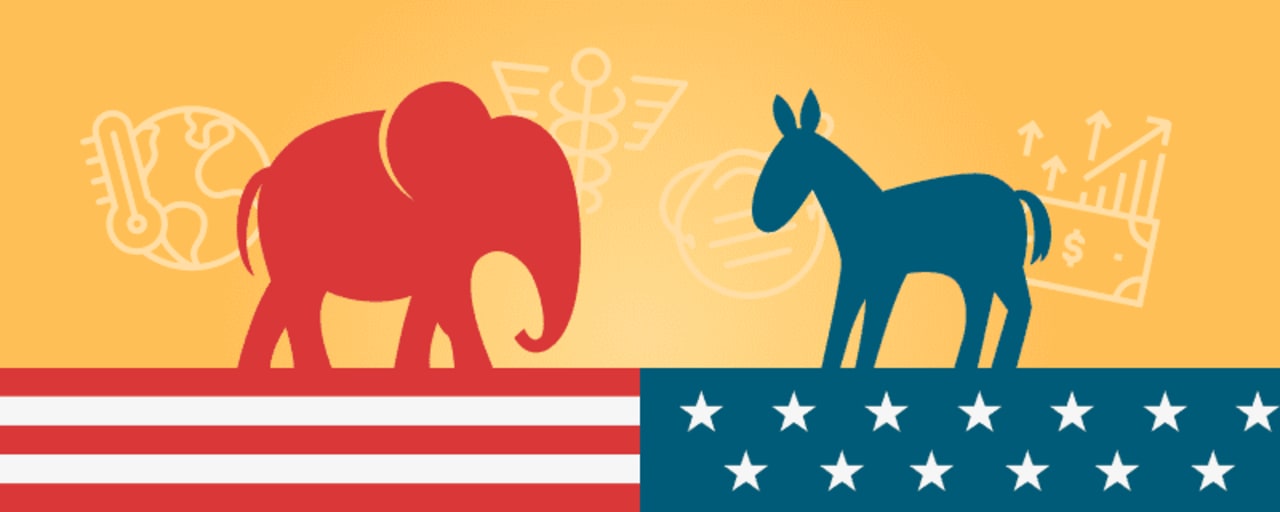Voter Guide for LGBTQ+ Students
- LGBTQ+ student voters face significant barriers, such as voter ID laws.
- LGBTQ+ college students benefit from knowing their voting rights and planning ahead.
- Major LGBTQ+ student issues include housing, student debt, and anti-LGBTQ+ policies.
- There are many ways to support LGBTQ+ student voter turnout.
According to the Williams Institute, as of the 2020 election season, 9 million LGBTQ+ adults were registered to vote and showed up in droves for the presidential election. Understanding what’s at stake, learning how to get involved in voter turnout efforts, and educating other voters about how candidates and ballot measures impact LGBTQ+ communities can empower queer and trans people to direct the outcomes of elections in their favor.
Voting Statistics for LGBTQ+ Students
64% of LGBTQ+ students don’t feel like either major political party represents their interests, which could impact their decision to participate in state and federal elections, according to a 2021 College Pulse survey.
21% of LGBT adults were not registered to vote during the 2020 election season compared to 17% of non-LGBT adults, according to the Williams Institute.
1 in 3LGBTQ people lived in the South in 2020, according to the Movement Advancement Project. Voter suppression tactics and anti-trans legislation disproportionately impact this region.
40%of youth experiencing homelessness identify as LGBTQ+, impacting their access to voting resources as well as having an address to include in their voter registration, according to the National Network for Youth.
20%of youth in the juvenile justice system were LGBTQ+ in 2015, according to the Prison Policy Initiative. There is a strong correlation between the high percentage of homeless LGBTQ+ youth and the increased likelihood of system-impacted youth ending up incarcerated.
The Most Important Political Issues for LGBTQ+ Students
 Anti-Trans Legislation
Anti-Trans Legislation
Many queer and trans communities are increasingly concerned about the ongoing surge of anti-trans legislation in many U.S. states. Southern states are especially saturated with anti-LGBTQ+ bills, such as the newly enacted “Don’t Say Gay” bill banning LGBTQ+ content in schools in Florida.
Dr. Charles “Tony” Smith, professor of political science and law at the University of Calfironia (UC) Irvine says, “The volume of anti-trans bills across many of the states, where elites are trying to see who can launch the cruelest attack on trans kids, may very well lead to increased enthusiasm and participation among LGBTQ+ voters.”
LGBTQ+ college student voters have a large stake in voting for candidates who will challenge or block these proposed policies from moving forward.
 Voter ID Laws and Suppression Tactics
Voter ID Laws and Suppression Tactics
Voter ID laws create particular hardships for trans and nonbinary voters whose IDs may not match their gender identity or chosen name. Many Republican-led states have introduced additional barriers to voting after the most recent presidential election, further hindering LGBTQ+ college students.
Nearly half of the eligible transgender voters in states with stricter voter ID laws might not be able to vote due to their IDs not reflecting their gender or name, according to the Williams Institute. The following states have strict photo ID laws in place to vote:
- Georgia
- Alabama
- Mississippi
- Tennessee
- Arkansas
- Kansas
- Indiana
- Wisconsin
 Student Loan Debt Forgiveness
Student Loan Debt Forgiveness
LGBTQ+ college students and graduates possess an average of $16,000 more student loan debt than the overall average, according to Student Loan Hero. Student loan forgiveness is an emerging campaign talking point by presidential candidates in recent years. It has excited hopes and expectations that this wavering promise will become a reality.
Job and Housing Protections: The Equality Act has been a major legislative battle for LGBTQ+ advocates for many years, as it would provide sweeping protections for LGBTQ+ communities in housing, employment, and more. In the absence of this federal legislation, job and housing protections must be a primary focus at all levels of government.
LGBTQ+ youth and adults — especially LGBTQ+ people of color — should be centered in policy considerations around housing and employment because they are disproportionately represented among homeless populations.
 Impacts of Policing and Incarceration
Impacts of Policing and Incarceration
LGBTQ+ people are overrepresented within the criminal justice system, which has staggering effects on their opportunities for participating in public life.
Most states don’t allow people with felony convictions to vote, and formerly incarcerated people encounter immense obstacles securing housing and employment. With LGBTQ+ communities largely impacted by the juvenile and criminal justice systems, voting rights for incarcerated people is an LGBTQ+ issue.
How Students Can Vote in Federal, State, and Local Elections
In Person
One method for voting is to cast your ballot in person. Start by double-checking your voter registration status to make sure your address matches your current residence so that you receive the correct polling information. Depending on your location, you may be able to vote early at a local government building, school, church, or business. Otherwise, you can vote in person on the day of an election at your designated polling place. In some areas, voters may be able to vote anywhere in their city, even on an election day.By Mail
Voting by mail is another potential option for voting in upcoming elections. Review your location’s requirements for requesting a mail or absentee ballot. Be sure to request it before the deadline. Once you receive your mail-in or absentee ballot, carefully review the instructions, and place your ballot in the mail or drop it off at an election office, depending on your location’s election procedures.
Five Ways Students Can Get Involved in the Midterm Elections
1. Join a campaign you care about.
Campaigns require people-power to spread the word about a candidate or ballot measure, and doing so can be a way for people who are not allowed to vote to take part in the political process. Websites for a candidate or cause you want to support should include information about how to volunteer. You can help with door-knocking or canvassing by phone. You can also contribute to the campaign in other ways. Dedicating your time to a cause that’s important to you can be a tool for connecting with others. That personal connection can encourage people to vote.
2. Make a voting plan.
Everyone’s voting experience is different, but everyone can benefit from planning, especially in states where college students face increased barriers to voting due to voter ID laws or bans on drive-through or mail-in voting. Knowing your rights, ensuring you have all the documentation needed in advance, and paying attention to any sudden changes to your polling place can reduce frustration and disruptions on election day for LGBTQ+ voters. Voting plans can also include learning what’s on your ballot ahead of time, determining how to get to the polls, requesting time off work, and aiding others in voting.
3. Participate in a voter registration drive.
Ensuring people are registered to vote is a basic step, and is another way non-voters can help. According to Headcount, at least 2 million voting-eligible LGBTQ+ Americans are not registered to vote. The organization focuses on running voter registration drives in places young LGBTQ+ voters are likely to be — such as concerts, festivals, and other community events. Coordinating or volunteering for voter registration drives on campus and other key spaces can help get more LGBTQ+ people one step closer to voting.
4. Share LGBTQ+ friendly voter guides.
It can be tricky for LGBTQ+ students to make informed choices about voting in their best interests. Being confused or unsure about candidates or ballot measures may deter LGBTQ+ students from showing up to vote. Sharing LGBTQ+ friendly voter guides made by trustworthy organizations can help others understand how a candidate or policy will directly impact LGBTQ+ communities. If you can’t find an LGBTQ+ focused resource about voting in your area, collaborate with others and make your own.
5. Coordinate rideshares or escorts to polling places.
LGBTQ+ college students may not feel comfortable going to the polls alone, whether their polling place is on or off campus. Finding ways to address this need by coordinating with others to provide rides, helping folks navigate public transportation in a group, or meeting up and heading to the campus polling place together could ease individuals’ hesitance to show up and cast their vote.
“Often members of targeted minority groups feel like there isn’t any reason to get involved if everyone in the government hates them and the system won’t protect them. But once we embrace that the community is large enough to be heard and that voting and participation are what lead to policymaker responsiveness, then full participation is critical for civil rights progress as well as for achieving the hope of full equality.”
— Dr. Charles “Tony” Smith, professor of political science at UC Irvine
Resources for LGBTQ+ Student Voters
Freedom for All Americans
Freedom for All Americans is a bipartisan campaign to obtain legal protections for LGBTQ+ people nationwide. This organization also tracks anti-LGBTQ+ legislation across the country and incorporates information about proposed bills into an interactive map.
BestColleges Student Voting Guide
BestColleges Student Voting Guide analyzes the impact of youth voters, reviews issues that matter to student voters, and offers a wide variety of resources for students looking to get involved in voter turnout efforts.
Victory Institute
Victory Institute is dedicated to uplifting LGBTQ+ leaders who have secured or are pursuing political office at any level of government. This organization tracks LGBTQ+ politicians across the country and provides campaign training to those interested in running or supporting LGBTQ+ candidates.
Transform the Vote
Transform the Vote is a National Center for Transgender Equality project that aims to support trans folks at their polling place. The guide lists need-to-know information about voters’ rights, especially in states with voter ID laws that could pose barriers for trans people.
Headcount
Headcount engages prospective voters and hosts voter registration drives at concerts, festivals, and community events. This organization offers numerous resources for helping LGBTQ+ people register to vote. They also offer information about helping homeless and formerly incarcerated folks understand their voting options.
With Advice From:

Charles “Tony” Smith received his PhD from the University of California-San Diego (2004), his JD from the University of Florida (1987). He is a Professor in Political Science and Law at the University of California-Irvine. He is the incoming Editor-in-Chief of Political Research Quarterly. His research is grounded in the American judiciary but encompasses work in both comparative and international frameworks using a variety of methodologies. The unifying theme of the research is how institutions, and the strategic interactions of political actors relate to the contestation over rights, law & courts, and democracy. He has published seven books including Elite-Led Mobilization and Gay Rights: Dispelling the Myth of Mass Opinion Backlash (University of Michigan Press 2021) and has published over 40 articles and chapters in journals such as the American Journal of Political Science, Law & Society Review, Political Research Quarterly, Justice Systems Journal, International Political Science Review, Judicature, Journal of Human Rights, Election Law Journal, Studies in Law, Politics & Society, Human Rights Review, and Journal of International Relations & Development, and New Political Science among other and in edited volumes with Cambridge University Press, Oxford University Press, Columbia University Press, and University of Pennsylvania Press, among others.



